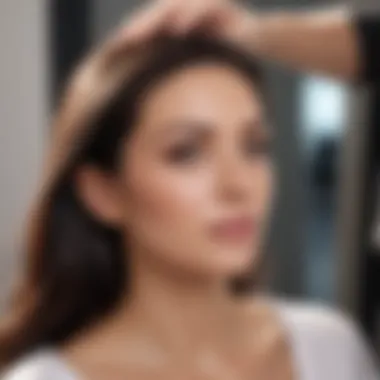Expert Guide: Top Strategies for Treating Hair Fall in Women


Insider Beauty Tips
Hair fall in females is a common concern that can have various underlying causes. Understanding these causes is crucial to finding effective treatments. Oftentimes, factors such as hormonal imbalances, nutritional deficiencies, stress, and improper hair care routines can contribute to hair fall. By delving into the root of the issue, women can address the problem from a holistic perspective and develop targeted solutions to promote hair growth and strength. Empowering females with this knowledge can lead to healthier, more vibrant hair.
Beauty Hacks
To combat hair fall, incorporating certain beauty hacks into one's daily routine can make a significant difference. Using essential oils like rosemary or peppermint can stimulate hair follicles and promote growth. Additionally, massaging the scalp regularly can improve blood circulation, delivering essential nutrients to the hair roots. Simple practices such as using a wide-tooth comb to avoid hair breakage and reducing heat styling can also prevent further damage and promote hair health.
Skincare Tips
Taking care of the scalp is essential in addressing hair fall. Just like the skin, the scalp requires proper care and nourishment to maintain a healthy environment for hair growth. Choosing gentle, sulfate-free shampoos and conditioners can prevent scalp dryness and irritation. Regular exfoliation with a scalp scrub can help remove buildup and unclog hair follicles, promoting a healthier growth cycle. Additionally, incorporating scalp massages and treatments enriched with vitamins and antioxidants can nourish the scalp and strengthen the hair strands.
Haircare Secrets
Incorporating some haircare secrets can play a significant role in treating hair fall. Avoiding tight hairstyles that pull on the hair or using harsh chemical treatments can prevent damage and breakage. Embracing natural hair masks with ingredients like avocado, coconut oil, or aloe vera can provide deep hydration and nourishment to the hair. Furthermore, opting for satin or silk pillowcases can reduce friction and prevent hair fall due to rubbing against rough surfaces during sleep.
Unlocking the secrets to combating hair fall in females involves a multifaceted approach that combines beauty hacks, skincare tips, and haircare secrets. By integrating these strategies into a comprehensive hair care routine, women can effectively address hair fall and restore their hair to its natural vibrancy and health.
Understanding the Causes of Hair Fall in Females
In this article, understanding the causes of hair fall in females is pivotal as it provides a foundation for effective treatment strategies. By delving into the underlying factors contributing to hair fall, individuals can address the root issues and implement targeted solutions to combat this common concern. Through a comprehensive exploration of hormonal imbalances, nutritional deficiencies, and stress-related factors, readers can gain valuable insights into their hair health and make informed decisions to restore vibrant and healthy hair.
Hormonal Imbalances
Hormonal imbalances play a significant role in hair health, influencing various aspects of hair growth and retention. Understanding the role of hormones in maintaining healthy hair is essential for identifying imbalances that may contribute to hair fall. By examining how hormonal changes affect hair quality and growth rates, individuals can pinpoint potential causes of hair loss and tailor their treatment approach accordingly.
Role of Hormones in Hair Health: Hormones regulate key processes in the body, including hair growth cycles. Imbalances can disrupt these cycles, leading to issues such as hair thinning and shedding. By addressing hormonal imbalances, individuals can restore equilibrium to promote healthier hair growth.
Effects of Hormonal Changes on Hair: Fluctuations in hormone levels can directly impact hair follicles, resulting in changes to hair texture, thickness, and overall appearance. Understanding how hormonal changes influence hair can guide individuals in implementing targeted treatments to address specific concerns.
Hormonal Disorders and Hair Fall: Certain medical conditions and hormonal disorders are linked to hair fall, underscoring the importance of managing underlying health issues. By addressing hormonal disorders, individuals can mitigate hair loss and promote optimal hair health.
Nutritional Deficiencies
Nutritional deficiencies can significantly impact hair growth and contribute to hair fall in females. Exploring the impact of essential nutrients on hair health is crucial for optimizing dietary choices and promoting stronger, healthier hair. By identifying common deficiencies linked to hair fall and embracing a balanced diet rich in essential nutrients, individuals can foster an ideal environment for robust hair growth.
Impact of Essential Nutrients on Hair Growth: Essential nutrients such as vitamins and minerals play a vital role in supporting hair growth and strength. Deficiencies in these nutrients can compromise hair health, leading to issues such as breakage and thinning. By prioritizing nutrient-dense foods and supplements, individuals can nourish their hair from within.
Common Deficiencies Linked to Hair Fall: Certain nutrients, such as iron, zinc, and biotin, are particularly crucial for healthy hair. Identifying and addressing common deficiencies associated with hair fall can help individuals restore balance and promote optimal hair growth.
Balanced Diet for Healthy Hair: Adopting a balanced diet inclusive of protein, vitamins, and antioxidants is essential for maintaining healthy hair. By fueling the body with nutrient-rich foods, individuals can support hair growth, minimize shedding, and enhance the overall quality of their hair.
Stress and Lifestyle Factors
Psychological stress and lifestyle choices can exert a profound impact on hair health, influencing factors such as hair loss and texture. Exploring the connection between stress levels, daily habits, and hair condition is crucial for developing personalized strategies to mitigate hair fall. By embracing stress management techniques and lifestyle modifications, individuals can create a conducive environment for robust and resilient hair.
Psychological Stress and Hair Fall: High stress levels can trigger hormonal fluctuations and impact hair follicles, leading to excessive shedding and thinning. Managing psychological stress through relaxation techniques and mindfulness practices can help individuals preserve the health and vitality of their hair.


Effect of Daily Habits on Hair Health: Daily habits, such as hair care routines and styling practices, can influence the condition of hair strands. By adopting gentle handling techniques and minimizing exposure to heat and chemicals, individuals can prevent damage and promote better hair health.
Strategies for Stress Management: Implementing stress management strategies, such as meditation, exercise, and adequate sleep, can help individuals cultivate a healthy mindset and reduce the impact of stress on hair health. By prioritizing self-care and wellness practices, individuals can safeguard their hair against the detrimental effects of chronic stress.
Diagnostic Approaches for Female Hair Fall
Hair fall in females can be a distressing issue that requires a thorough understanding to effectively address. In this section, we will delve into the critical diagnostic approaches essential for pinpointing the root causes of hair fall in women. By emphasizing the significance of diagnostic methods, this article aims to equip readers with the knowledge needed to make informed decisions regarding their hair health.
Consultation with Dermatologist
When it comes to combating hair fall, seeking professional evaluation from a dermatologist is paramount. The importance of this step lies in the expertise and specialized knowledge that dermatologists bring to the table. Their thorough evaluation of the scalp and hair can reveal underlying issues that may not be apparent to the naked eye. By partnering with a dermatologist, individuals can receive personalized guidance and tailored treatment plans to address their specific hair fall concerns.
Importance of Professional Evaluation
The professional evaluation conducted by dermatologists holds significant weight in the journey to combat hair fall. Their specialized training enables them to identify various scalp and hair conditions accurately. This contributes to a more targeted and effective approach to treatment. Partnering with a dermatologist ensures access to expert advice and guidance throughout the hair restoration process.
Hair and Scalp Examination
A crucial aspect of the consultation with a dermatologist is the comprehensive examination of the hair and scalp. This examination involves analyzing the scalp condition, hair follicles, and overall hair health. By examining these elements, dermatologists can assess the extent of hair fall, identify potential triggers, and recommend suitable treatment options.
Diagnostic Tests for Hair Loss
In addition to physical examinations, dermatologists may recommend diagnostic tests to delve deeper into the underlying causes of hair fall. These tests could include blood tests to check for nutritional deficiencies, hormonal imbalances, or other systemic conditions impacting hair health. Diagnostic tests provide valuable insights that inform the dermatologist's treatment approach, ensuring a holistic and personalized plan for each individual.
Trichoscopy and Scalp Analysis
Trichoscopy and scalp analysis are invaluable tools in the assessment of hair fall patterns and scalp health. Understanding the intricacies of these procedures can shed light on the underlying factors contributing to hair fall in females.
Understanding Trichoscopy Procedure
Trichoscopy involves the microscopic evaluation of the scalp and hair follicles to assess various parameters such as hair density, thickness, and overall scalp condition. This non-invasive procedure provides detailed insights that aid dermatologists in diagnosing different types of hair loss and formulating targeted treatment regimens.
Significance of Scalp Analysis
Scalp analysis plays a pivotal role in determining the overall health of the scalp. By examining the scalp closely, dermatologists can identify conditions like dandruff, inflammation, or infections that may be linked to hair fall. Addressing scalp issues is crucial for creating an optimal environment for healthy hair growth.
Interpreting Trichoscopy Results
Interpreting trichoscopy results requires expertise and a keen eye for detail. Dermatologists analyze the findings from trichoscopic images to identify specific patterns associated with different types of hair loss. These insights help customize treatment plans and monitor the progress of hair regrowth over time.
Biopsy for Definitive Diagnosis
In cases where the cause of hair fall remains unclear, a hair follicle biopsy may be recommended for a definitive diagnosis. This procedure offers in-depth information about the hair follicles and can uncover underlying conditions contributing to excessive hair shedding.
Indications for Hair Follicle Biopsy
Hair follicle biopsy is typically indicated when other diagnostic methods have not yielded conclusive results. It is particularly useful in cases of scarring alopecia or unexplained hair loss where a direct examination of the follicles is necessary for diagnosis. By providing a microscopic view of the hair follicles, this procedure aids in determining the appropriate course of treatment.


Process of Hair Biopsy
During a hair biopsy, a small sample of scalp tissue containing hair follicles is extracted and examined under a microscope. This process allows dermatologists to observe the structure of the follicles, any abnormalities present, and the overall health of the scalp at a cellular level. The information obtained from a hair biopsy is instrumental in guiding treatment decisions and understanding the underlying pathology of hair loss.
Role in Identifying Underlying Conditions
Hair follicle biopsies play a crucial role in identifying underlying conditions that may be contributing to hair fall. By analyzing the tissue sample, dermatologists can pinpoint specific disorders, infections, or inflammatory conditions affecting the hair follicles. This insight is invaluable for creating tailored treatment plans that target the root cause of hair loss and promote long-term hair health.
Effective Treatments for Hair Fall in Females
In the realm of combatting hair fall in females, the focus on effective treatments plays a pivotal role. Understanding the diverse range of strategies available for addressing this common concern empowers individuals to take charge of their hair health. With a plethora of options spanning from topical solutions to advanced procedures, the topic of effective treatments stands as a beacon of hope for those seeking to restore their hair's vitality. By delving into the nuances of each treatment approach, individuals can tailor their regimen to suit their specific needs and goals, ultimately working towards healthier and more resilient hair.
Topical Solutions and Medications
When delving into the realm of topical solutions and medications for combating hair fall, the spotlight shines brightly on
Minoxidil for Hair Regrowth
In the landscape of tackling hair fall, Minoxidil for hair regrowth emerges as a standout solution. The unique characteristic of Minoxidil lies in its ability to stimulate hair follicles, promoting growth and thickness. A popular choice in the arsenal against hair loss, Minoxidil offers a non-invasive and easy-to-use option for those navigating this journey. While Minoxidil showcases notable benefits in fostering hair regrowth, individuals must be mindful of potential side effects or irritations it may pose in the course of treatment.
Prescription Medications for Hair Loss
Turning to prescription medications for combatting hair loss unveils a realm of clinically-backed treatments. The key characteristic of prescription medications lies in their targeted approach towards addressing underlying causes of hair fall. As a popular choice within the medical community, prescription medications offer a specialized and potent option for individuals seeking to tackle hair loss with precision. It is essential to weigh the benefits of prescription medications against any potential side effects or contraindications, ensuring a well-informed decision is made regarding treatment.
Over-the-Counter Treatments
Exploring over-the-counter treatments for hair fall introduces a convenient and accessible avenue for individuals seeking to bolster their hair health. The key characteristic of over-the-counter treatments is their widespread availability and ease of procurement. A go-to choice for many individuals, over-the-counter treatments provide a starting point for addressing mild to moderate hair fall concerns. While these treatments offer convenience, individuals should be mindful of their efficacy compared to prescription or advanced therapies, keeping realistic expectations in mind.
Nutritional Supplements and Diet Modifications
Within the spectrum of combating hair fall, the integration of nutritional supplements and diet modifications plays a crucial role in nurturing hair health and growth. By harnessing the power of essential vitamins and minerals, individuals can fortify their internal ecosystem to support robust hair growth. Embracing dietary changes further amplifies the impact, offering a holistic approach towards addressing hair fall concerns. By diving into the benefits and nuances of each dietary modification, individuals can sculpt a nutritionally sound routine that nurtures their hair from within.
Vitamins and Minerals for Hair Health
Exploring the world of vitamins and minerals specific to hair health unveils a treasure trove of essential nutrients essential for optimal hair growth. The key characteristic of vitamins and minerals lies in their role as building blocks for strong and healthy hair follicles. A beneficial choice endorsed by nutritionists and dermatologists alike, vitamins and minerals offer a natural and effective route towards combating hair fall. While the advantages are abundant, individuals should be cautious of potential overdosing or imbalances in their quest for healthier hair.
Benefits of Dietary Changes
Embarking on dietary changes to boost hair health presents a host of benefits extending far beyond the surface. The key characteristic of these dietary modifications lies in their ability to fuel the body with the necessary nutrients for vibrant hair growth. A popular choice among those seeking a holistic approach to hair fall treatment, dietary changes offer sustainable and long-term benefits for overall well-being. Despite the advantages, individuals should approach dietary modifications with balance and moderation, ensuring a well-rounded nutritional intake.
Supplements for Hair Growth
Incorporating supplements into one's daily regimen to foster hair growth opens a realm of targeted and potent solutions. The key characteristic of hair growth supplements lies in their concentrated dosage of essential nutrients tailored for hair health. A beneficial choice for individuals with specific hair concerns, supplements offer a potent boost to existing efforts in combatting hair fall. While the advantages are substantial, individuals should exercise caution in selecting supplements, ensuring they align with their unique needs and dietary habits.
Advanced Therapies and Procedures
Navigating the landscape of advanced therapies and procedures for combating hair fall unveils a realm of innovative and specialized treatments. By exploring cutting-edge techniques, individuals can access a spectrum of options tailored to their specific needs and goals. Whether opting for platelet-rich plasma therapy, low-level laser therapy, or hair transplantation techniques, the realm of advanced therapies offers promising solutions to address hair fall concerns with precision and efficacy.


Platelet-Rich Plasma (PRP) Therapy
Delving into the domain of platelet-rich plasma (PRP) therapy sheds light on a revolutionary approach towards hair restoration. The key characteristic of PRP therapy lies in its ability to harness the body's natural healing mechanisms to stimulate hair growth. A popular choice among individuals seeking non-invasive treatments, PRP therapy offers promising results backed by scientific research. While the advantages are notable, individuals should consult with professionals to understand the procedure's intricacies and potential outcomes.
Low-Level Laser Therapy (LLLT)
Embracing low-level laser therapy (LLLT) for combatting hair fall introduces a non-invasive and targeted solution to bolster hair health. The key characteristic of LLLT lies in its ability to enhance blood circulation to the scalp, promoting hair follicle rejuvenation. A beneficial choice for individuals seeking gentle yet effective treatments, LLLT showcases promising results in mitigating hair fall concerns. Despite the benefits, individuals should commit to regular sessions to fully reap the rewards of this therapy.
Hair Transplantation Techniques
Embarking on hair transplantation techniques presents a transformative approach to addressing hair fall and restoring natural hair density. The key characteristic of hair transplantation lies in its ability to redistribute healthy hair follicles to areas experiencing thinning or balding. A popular choice among individuals seeking a permanent solution to hair loss, hair transplantation techniques offer enduring results that mirror natural hair growth. While the advantages are substantial, individuals should undergo thorough consultations to ascertain the most suitable technique for their unique hair concerns.
Lifestyle Changes and Home Remedies
Hair Care Practices
Gentle Hair Handling Techniques
Exploring the intricacies of gentle hair handling techniques is key in nurturing and maintaining healthy hair. The emphasis on delicacy and care during grooming sessions contributes significantly to the overall goal of promoting hair health. Gentle hair handling stands out as a beneficial choice within this article due to its protective nature, safeguarding hair from unnecessary damage and breakage. The unique feature of gentle hair handling lies in its ability to preserve hair strength and quality, providing an advantage in combating hair fall.
Avoiding Heat and Chemical Damage
Delving into the importance of avoiding heat and chemical damage unveils a crucial aspect of hair care practices for females battling hair fall. By steering clear of excessive heat styling tools and harsh chemical treatments, individuals can protect their hair from drying out and weakening. The essence of this practice within this article lies in its ability to maintain hair integrity and prevent further hair fall. While the unique feature of avoiding heat and chemical damage offers a protective shield to the hair, it is essential to note its advantage in promoting overall hair health.
Best Shampoos and Conditioners
Discussing the significance of choosing the best shampoos and conditioners sheds light on the essential part they play in promoting healthy hair growth. Opting for quality hair care products that align with individual hair needs can make a substantial difference in combatting hair fall. The standout characteristic of these products within this article is their ability to nourish and strengthen hair from the roots to the tips, fostering optimal hair health. While highlighting the unique features of best shampoos and conditioners, their advantage in enhancing hair texture and combatting hair fall becomes evident.
DIY Hair Masks and Treatments
Natural Ingredients for Hair Nourishment
Exploring the benefits of natural ingredients for hair nourishment uncovers a holistic approach to treating hair fall. These ingredients play a vital role in providing essential nutrients to the hair, aiding in its growth and strength. Within this article, the emphasis on natural ingredients as part of DIY hair masks and treatments highlights their popularity due to their nourishing and revitalizing properties. The unique feature of natural ingredients lies in their ability to replenish hair health naturally, presenting an advantage in restoring hair vitality.
Homemade Recipes for Hair Growth
Delving into homemade recipes for hair growth unveils a cost-effective and customizable approach to tackling hair fall. These recipes, crafted from readily available ingredients, offer individuals the opportunity to cater to their hair's specific needs. The key characteristic of homemade recipes within this article is their adaptability and potency in promoting hair growth and combatting hair fall. By exploring the unique features of homemade recipes, their advantage in providing tailored solutions for individual hair concerns is highlighted.
Benefits of Regular Hair Masks
Unveiling the benefits of regular hair masks emphasizes the transformative impact of consistent nourishment on hair health. Incorporating hair masks into a routine skincare regimen can significantly enhance hair strength and vitality. The standout characteristic of regular hair masks within this article is their ability to revive and replenish hair from within, promoting long-term hair health. By emphasizing the benefits of regular hair masks, their advantage in sustaining hair growth and combatting hair fall is underscored.
Stress Management and Exercise
Impact of Stress on Hair Health
Analyzing the impact of stress on hair health reveals a significant relationship between emotional well-being and hair condition. Stress and anxiety can manifest visibly in hair health, leading to issues such as hair fall. Within this article, understanding the detrimental effects of stress highlights its necessity for holistic hair care. The key characteristic of stress management lies in its ability to address underlying factors contributing to hair fall, making it a valuable choice for individuals seeking comprehensive solutions.
Meditation and Relaxation Techniques
Exploring the benefits of meditation and relaxation techniques unveils a potent method for managing stress and promoting overall well-being. Incorporating mindfulness practices into daily routines can aid in reducing stress levels and restoring emotional equilibrium. The unique feature of meditation and relaxation techniques within this article is their capacity to not only benefit hair health but also enhance overall quality of life. By highlighting the advantages of these techniques, their contribution to stress management and combating hair fall becomes evident.
Exercise for Improved Circulation
Emphasizing the role of exercise in improving circulation offers a proactive approach to addressing hair fall. Physical activity, such as cardio exercises, can enhance blood flow to the scalp, promoting hair growth and strength. The key characteristic of exercises within this article is their ability to stimulate hair follicles and facilitate nutrient delivery, supporting healthy hair maintenance. By shedding light on the advantages of incorporating exercise into a hair care routine, the potential for improved circulation and minimized hair fall is underscored.







